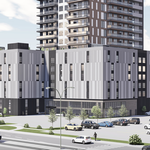^^^
Which would be fine if you are in the business of selling immediately or almost immediately since you use your say 15% levlerage..
With prices at their present levels, while this was the case in the past 14 years, it will not necessarily be the case going forward. Remember leverage is a 2 way sword. If prices go down, your "15% leverage" is destroyed much faster. (The mortgage figure is a constant and your equity is destroyed at a much faster rate.
Consider as well the opportunity cost of the extra capital (the $180K difference). One could make other investments that may return as much, eg. stock market; not that I am advocating this; but especially if margined or options traded, could result in the similar gains. You might say that is risky but buying with leverage because one "expects price increases to justify the leverage" is a risky strategy.
It has worked since 1996 -2010. Property prices increased yearly because bond prices and hence mortgage rates have been more or less on a steady decline.
It would not have worked from 1989-1995. It worked very well from 1985-1989. This is for Toronto.
Didn't work so well in the US from 2007-2010. Worked great from 2000-early 2006.
My point is if you believe that the present $100 or so on average in the core of Toronto downtown premium for future appreciation on new construction is sustainable or for that matter will increase, then TCW you are correct in my view. If prices decrease or the perspective of the market is such that there is no or minimal price escalation to come in the next 3-4 years, the gap between new and resale could easily narrow from the $100 which would negate the leverage gains and could result in losses.
One final point; investors view real estate as you are suggesting. I am not talking speculators/flippers. Most presumably can afford to take a longer term view and can survive if they have a negative value investment for a time. People buying to live who might well be stretching to carry the mortgage on the more expensive property once closed and carry it on an ongoing basis have to consider in my example that they are gong to be giving up something to make up the $3600/year difference and may be stretching themselves to meet the additional $300/month payments.
Carrying the logic to the extreme, one should buy the most expensive property once can with the least amount down. The potential returns are the greatest. So are the risks.
The slightest downturn and one "no longer sleeps at night". Of course, if one can invest with 15% down but has another 15% accessible (to allow for say a 15% downturn in prices), one can undertake the risk.
I just read daveto's comment. Thanks dave for saying in 1 sentence that which took me a thesis defence to present. I feel like an idiot. LOL





